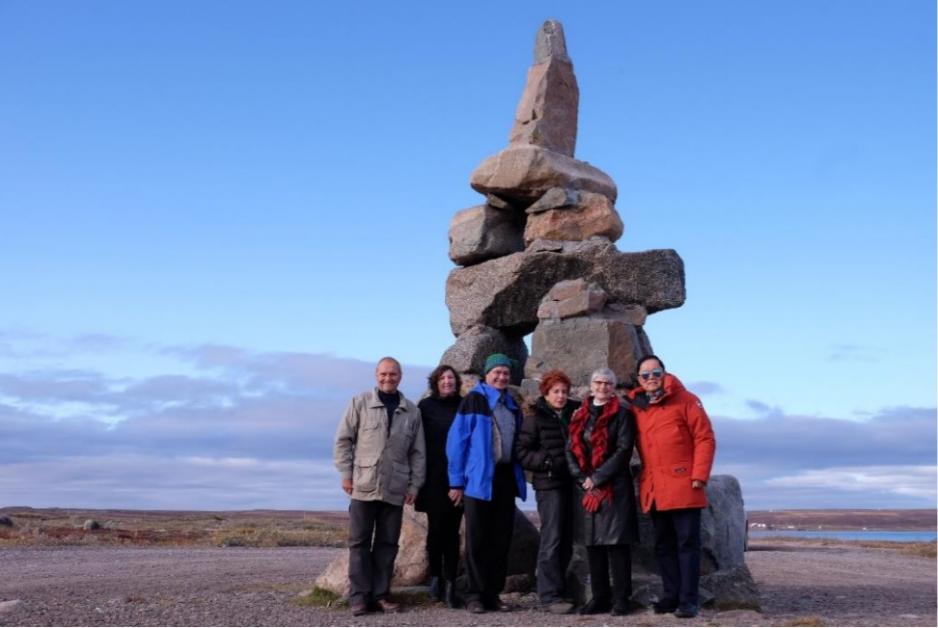Recommends a Change of Policy Canadian Senate Study Acknowledges Past Neglect of Arctic Areas

The Baker Lake Inukshuk, members of the Special Senate Committee to the Arctic. (Photo: The Canadian Senate)
Canada has neglected and disregarded its Arctic region for too long. A failure to develop this region in the future will have long-term negative impacts for the country.
By: Karen Marie Oseland
This straightforward conclusion comes from a special committee of the Canadian Senate’s study on its Northern regions. The committee consisting of nine senators published a study on June 11, titled “Northern Lights: A Wake-Up Call for the Future of Canada.”
The study was straightforward in its assessment that the country’s North can no longer be neglected, making the case that Canada’s future depends on greater investment, support, and attention to its northern regions.
Why a Study Now?
In September 27, 2017 the Senate established a special committee to conduct a study that examined the “significant and rapid changes to the Arctic and impacts on original inhabitants.” The committee was further tasked with providing the government with recommendations for future federal policy in the region. The Canadian government seeks to develop a new policy framework for its Arctic regions. This study aims to better inform those efforts by providing a variety of recommendations that address many of the issues that have been historically ignored by the federal government.
Recommendations
The study provided a total of 30 recommendations divided into 4 themes.
The themes focused on the social, cultural, economic, and global issues of the region. Specifically, the study states that the people in these regions are a valuable resource that when properly invested in have the potential to drive the economy for the next decade.
The Canadian Arctic makes up 25% of the international circumpolar region yet its economic production accounts for less than 2% of the circumpolar economy.
A historical lack of investment and attention in the region has led to its severe underdevelopment and stagnating growth. The Canadian Arctic makes up 25% of the international circumpolar region yet its economic production accounts for less than 2% of the circumpolar economy. There are still areas in the north in which people lack consistent access to water, sanitation, housing, schools, and healthcare. The recommendations strive to change this by detailing how the federal government can better improve its engagement and investment in the region. The study does not recommend a top down approach to its future Arctic policy. Instead in its recommendations it consistently stresses the need for cooperation with local governments, indigenous peoples, and greater regional organizations like the Arctic Council.
In regard to indigenous people, the study emphasizes the importance of these communities in the North. Indigenous and First Nations communities make up more than half of the population in the region, and the knowledge and traditions they hold can help maintain the environment of the area, improve the economy, and help scientific research. If the northern areas are to reach their full potential, greater and consistent focus on investment must be put into them.
The youth of the area also have a vital role to play in future development, as the study notes the area has a young population. To take advantage of this the indigenous and First Nations youth need greater support so they can deal with the rapid social and economic changes occurring in the region. The youth are seen as one of the Arctic’s biggest assets to respond to the changing environment. Yet, poor quality education is currently the only constant.
The youth are seen as one of the Arctic’s biggest assets to respond to the changing environment
The committee recommends 3 ways of addressing this issue: 1) increase funding for Basic Adult Education; 2) ensure students can pursue studies in their Indigenous language; and 3) support the Government of Nunavut to establish a university in the Eastern Arctic.
Missing Perspectives
While the study was extensive, and many groups had a chance to lend their voices to the final product, many others did not. Several First Nations governments, youth associations, and women’s organizations did not get a chance to be interviewed as a result of the limited timeframe of the study. The study acknowledges this failure but does not include any recommendations on how to mitigate it in the future. While this does not diminish the importance of the study, a large focus of it was on youth and First Nations issues. Their input remains vital for the future of the region. As noted in the study in several instances.
Towards the Future
Canada’s future lies in the North, and the study seeks to overcome past neglect by recommending tangible solutions to many of the issues that currently exist in Canada’s Northern regions. It can be seen as an important first step in acknowledging the importance of the area and in supporting the people that live there. It now remains to be seen whether any of the policy recommendations are included in the government's Arctic Policy Framework and future plans for the area.
